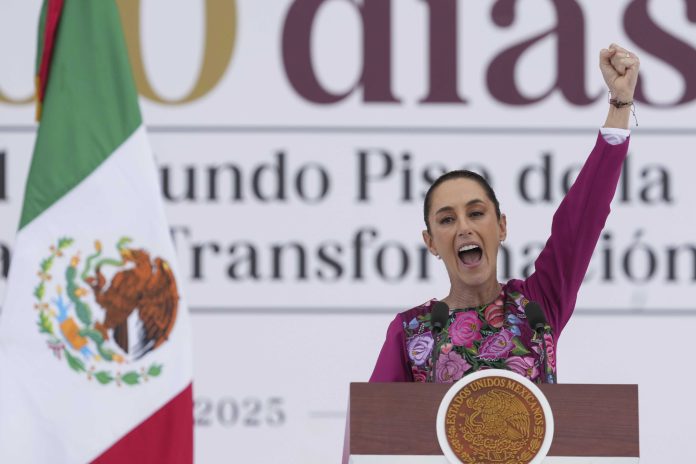
By MEGAN JANETSKY
Associated Press
MEXICO CITY (AP) — Mexico President Claudia Sheinbaum said Tuesday that President Donald Trump’s executive order moving toward designating drug cartels as foreign terrorist organizations would only impact Mexico if there’s close coordination between the two governments.
She said that Mexico would defend its sovereignty and independence while seeking coordination with the U.S. in the wake of the order signed Monday.
“We all want to fight the drug cartels,” Sheinbaum said at her daily press briefing. The U.S. “in their territory, us in our territory.”
Trump’s order highlighted Mexican drug cartels and other Latin American criminal groups like Venezuelan gang Tren de Aragua and Salvadoran gang Mara Salvatrucha (MS-13). The order says they “threaten the safety of the American people, the security of the United States, and the stability of the international order in the Western Hemisphere.”
The order did not list any Mexican cartels by name but said Cabinet secretaries would recommend groups for designation as terrorist organizations in the next 14 days. It was among a slew of executive orders Trump signed Monday to kick off his administration, several of which focus on securing the southern border.
“The Cartels have engaged in a campaign of violence and terror throughout the Western Hemisphere that has not only destabilized countries with significant importance for our national interests but also flooded the United States with deadly drugs, violent criminals, and vicious gangs,” the order reads.
It was unclear what the impact could be for fighting the cartels, but there was concern it could be another way to make it more difficult for people from the countries where those groups operate to access the U.S.
In came in addition to measures including the declaration of an emergency on the U.S. southern border, a promise to slap 25% tariffs on Mexico and Canada on Feb. 1 and ending the use of the CBP One app, which allowed migrants to apply for asylum appointments before reaching the border.
Trump has also promised to carry out mass deportations and threatened military intervention in Mexico to fight cartels, something sharply rejected by Sheinbaum.
Many have voiced concern the terrorist designation could provide the U.S. justification to take military action against cartels.
Vanda Felbab-Brown, an organized crime expert at the Brookings Institution, said the order could have “huge implications from trade to migrants.”
As cartels have gained a firm grip on control of the lucrative migrant smuggling trade in recent years, it’s virtually impossible for migrants and asylum seekers to pass through Mexico and other Latin American countries without paying some sort of fee to cartels.
The moment they do, Felbab-Brown said, it could disqualify them from seeking asylum.
“Trump can essentially prevent the vast majority of undocumented migrants trying to cross the U.S. border from getting asylum,” she said.
Mike Vigil, a former head of the U.S. Drug Enforcement Administration’s foreign operations, said he expected any terrorism designation to have very little impact on day-to-day operations against cartels because many of the same anti-terrorism powers American authorities would be granted are already employ in counter-narcotics efforts.
“It’s already been done. This is nothing new,” Vigil said. “It’s all political theater and tossing a piece of stale salami to (Trump’s) base.”
He said logistically the order would likely allow the U.S. to seize assets of groups in the U.S., sanction U.S. citizens that do business with terrorist organizations and block members of those groups from entering the U.S.
“It’s not going to allow the U.S. to send troops into Mexico like so many people think simply because people forget that Mexico is a sovereign country and it would be an act of war,” he said.
The move comes as cartel violence has intensified in northern Mexican states after the kidnapping and detention of kingpin Ismael “El Mayo” Zambada sparked an all-out war between rival factions of the Sinaloa cartel. Gunmen continue to leave mutilated bodies scattered across the state and kidnap people even from hospitals.
It’s part of a larger shifting dynamic in cartel warfare in the Latin American nation. Years ago, a handful of criminal organizations headed by a few key capos controlled large parts of Mexico. Now, many more factions have violently fought for power, as they’ve become more agile and harder to pin down.
They’ve used more sophisticated tools like bomb-dropping drones, improvised explosive devices and rigged armored vehicles, and have expanded into migrant trafficking and the avocado trade. Meanwhile, thousands of Mexican citizens have gotten caught in the crossfire, having been slain or gone missing.
Some relatives of cartel victims in violence-torn areas of Mexico hoped that designating the cartels as terrorist organizations could help their quest for justice.
Adrián LeBarón, whose daughter was killed in a 2019 massacre in northern Mexico, said he hoped it could raise visibility for victims of violence in Mexico, one of the most violent countries in the world that is not actively at war.
LeBarón, who has called the massacre a terrorist attack, said the designation could pressure authorities to bring justice to victims of violence.
“An investigation into terrorism is justice not only for us, but also for every town and corner of the country where a family has been destroyed and terror is sown in its wake,” he wrote on a post on the social media platform X.



















